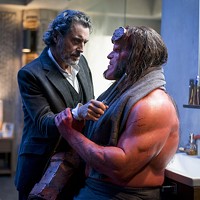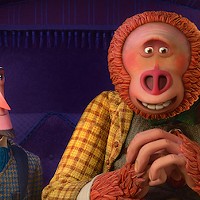

BROKEBACK MOUNTAIN Rating: ***1/2 DIRECTED BY Ang Lee STARS Heath Ledger, Jake Gyllenhaal
Has there ever existed a movie genre simultaneously as macho and as rife with homoerotic undertones as the Western?
With the exception of the war flick, no other film classification has found as little use for women as this one. The camaraderie tends to blossom between men, taciturn hunks who need only to glance at each other to convey what's going on in their minds. These screen cowboys are prone to whipping out their firing rods in a show of dominance or given to standing against expansive backdrops while staring wistfully in the distance, as if they were channeling Wuthering Heights' Cathy peering across the English moors or Gone With the Wind's Scarlett taking in the sights of Tara.
Of course, there's no quibbling with the rigid heterosexuality of the heroic frontiersmen played by the likes of John Wayne or Gary Cooper. But in the Howard Hawks-Wayne collaboration Red River, there's a palpable sense of homoerotic tension between Montgomery Clift and John Ireland, particularly in the sequence in which they lovingly fondle each other's pistols. Midnight Cowboy, still one of the best (and most uncompromising) films to ever emerge from Hollywood, turns the notion of the straight cowpoke on its head thanks to its depiction of Jon Voight's bisexual stud decked out in shiny Western garb. As for the camp outing Lust In the Dust, starring Divine and Tab Hunter... well, let's not even go there.
So in hindsight, it now seems like a no-brainer that Annie Proulx's short story Brokeback Mountain should have been brought to the big screen. Whatever its literary heritage, this tale belongs in the movies -- if anything, it's arriving about three decades too late, as the natural order of things suggests that this movie would be most at home within the canon of early-70s cinema. (Of course, Proulx didn't write the story until 1997, but indulge me for a moment.) For one reason, that period saw the release of all manner of envelope-pushing pictures, and this film -- in its current incantation almost erring on the side of too much propriety -- could have benefited from a more raw presentation (plus, it's easy to envision Martin Sheen and Jeff Bridges in the leading roles). For another, the 70s saw the last gasp of the Western as an omniscient film genre (soon to be replaced by the sci-fi epic), and Brokeback Mountain would have served as an effective exclamation mark to cinema's Western legacy up until that time.
Instead, Brokeback Mountain arrives in theaters in the toddler stage of the 21st century, and with it come different sets of perceptions and expectations. That the film is already doing gangbusters business in progressive cities like New York and Los Angeles is no surprise (in limited release alone, it's already earned back its production costs); the big question is how it will perform in the fly-over portion of the country, specifically rural areas in which locals long brainwashed by hatemongers to view homosexuals as emissaries of Satan are just as likely to beat a gay man to death as to give him the time of day (this toast's for you, Matthew Shepard).
Ultimately, it doesn't matter what the nation's in-bred yahoos and right-wing commentators think about the film: Most likely, they won't turn out for it any more than they did for, say, Lost In Translation, Eternal Sunshine of the Spotless Mind or any other challenging movie that had nothing to do with homosexuality but plenty to do with breaking away from the conventional pack. But the secret behind Brokeback Mountain is that, behind its convenient (and infuriating) designation as "the gay cowboy movie," this is as universal as any love story Hollywood has produced in recent times. Working from an incisive script by Larry McMurtry (Lonesome Dove) and Diana Ossana, director Ang Lee has managed to make a movie that vibrates on two separate settings: It's a story about the love between two men, yes, but it's also a meditation on the strict societal rules that keep any two people -- regardless of gender, race, class, religion, etc. -- out of each other's arms.
The story begins in 1963 Wyoming, when two young cowboys -- reserved Ennis Del Mar (Heath Ledger) and the more outgoing Jack Twist (Jake Gyllenhaal) -- are hired by a gruff rancher (Randy Quaid) to tend to a flock of sheep up on Brokeback Mountain. It's a dull, thankless job, forcing the lads to spend an entire season isolated from the rest of the world. One night, when it's too cold to sleep alone, the pair huddle up together inside their small tent; before long, Jack is forcefully kissing Ennis and, to his own surprise, Ennis responds in an equally aggressive manner.
"I ain't queer," Ennis plainly states the morning after their tryst, and you sense that he's lying neither to Jack nor himself. The force of his emotions is so strong that he's forgiven for not knowing from where they erupted. At any rate, after spending some more quality time together up on that mountain, the men separate, each going on to pursue a more traditional lifestyle. For Ennis, that means marrying his longtime sweetheart, Alma (Michelle Williams), and producing some kids. For Jack, that means trying his hand once again on the rodeo circuit, where he eventually meets his future wife, Lureen (Anne Hathaway). It isn't until some time later that the men finally see each other again, and upon their first embrace it's clear that they've been bottling up a significant part of their lives.
Over the next two decades, Ennis and Jack deceive their spouses as they take off together for the occasional "fishing trip." The wives deserve better -- Hathaway and especially Williams create wholly sympathetic characters -- but so do the men, who would like nothing more than to have gotten their own place together and voided all reasons to lie to the people around them. But while Jack, clearly more comfortable with his homosexuality, repeatedly pushes that notion, Ennis, remembering a tragic event from his childhood, refuses to even consider it, certain that any outward hint of a relationship between them would mean their deaths.
Ultimately, Brokeback Mountain is about longing and loneliness as much as it's about love. Ang Lee, who has previously helmed movies in which characters cling to the hope that they'll end up in the arms of their soulmate (Sense and Sensibility, Crouching Tiger, Hidden Dragon), takes that theme to a cruel extreme in this film: After the opening set-up on the mountain, loss and regret become tangible presences, dogging the central characters over the course of the story's two decades. This culminates in a wallop of a final scene, a haunting moment made even more moving by Gustavo Santaolalla's excellent music score.
As Jack, Gyllenhaal delivers a nicely modulated performance that's by turns silly and sullen, as the peppy kid looking forward to life's challenges turns into a frustrated adult ultimately discouraged by the number of obstacles that's been thrown in his path. The weakness in his work -- that he doesn't completely disappear into his character -- is only noticeable because his co-star is operating at such a stratospheric level. Ledger, in short, is phenomenal as Ennis, the sort of pensive individual who's so reluctant to speak that it appears as if uttering a syllable is as strenuous for him as lifting a refrigerator is to the rest of us. Thanks to Ledger, Ennis' anguish causes our own hearts to break on his behalf. And depending on one's own viewpoint, the torment caused by his ardor -- an impossible longing in an impossible world -- either confirms or contradicts the veracity of Alfred Tennyson's venerable adage, "I hold it true, whate'er befall; I feel it when I sorrow most; Tis better to have loved and lost Than never to have loved at all."


